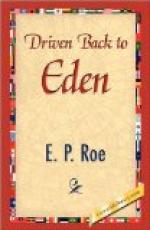“But the garden is all filled up,” I said, thoughtfully; “and I fear it is too late to plant now.”
Looks of disappointment led me to think further and I got one of my seed catalogues.
“Here are some early kinds named and perhaps they would mature; but where shall we put them?”
“Seems to me we had better have a little less corn, if room can be made for melons,” was Merton’s suggestion.
“I’ll tell you what we’ll do,” I continued. “We’ve had such good fortune in accomplishing our early work, and you have helped so nicely, that you shall try your hand at melons. Drive your mother and Mousie down to the village this morning, and get some seeds of the nutmeg musk-melon and Phinney’s early watermelon. I’ll take two rows in the early corn on the warm garden slope, pull up every third hill, and make, in their places, nice, warm, rich beds for the seed which we will plant as soon as you come back. I don’t believe the corn will shade the melon vines too much; and as soon as we have taken off the green ears we will cut away the stalks. Thus we shall get two crops from the same ground.”
This plan was carried out, and the melon seed came up in a very promising way.
CHAPTER XXX
WEEDS AND WORKING FOR DEAR LIFE
The beautiful transition period of spring passing into summer would have filled us with delight had we not found a hostile army advancing on us—annual weeds. When we planted the garden, the soil was brown and clean. The early vegetables came up in well-defined green rows, the weeds appearing with them, too few and scattered to cause anxiety. Now all was changed. Weeds seemed created by magic in a night. The garden was becoming evenly green throughout; and the vegetables, in some cases, could scarcely be distinguished from the ranker growth of crowding, unknown plants among and around them. I also saw that our corn and potato field would soon become, if left alone, as verdant as the meadow beyond. I began to fear that we could not cope with these myriads of foes, little now, but growing while we slept, and stealing a march on us in one part of the place while we destroyed them in another.
With something like dismay I called Mr. Jones’s attention to these silent forces, invading, not only the garden and fields, but the raspberries and, indeed, all the ground now devoted to fruit.
He laughed and said: “The Philistines are on you, sure enough. I’m busy whackin’ them over myself, but I guess I’ll have to come and give you a lift, for you must get these weeds well under before hayin’ and raspberry-pickin’-time comes. It’s warm to-day, and the ground’s middlin’ dry. I’ll show you what can be done in short metre. By the way, I’ll give you a little wrinkle worth knowin’. I’ve observed that you didn’t bring the children to the country to be like weeds—just ter grow and run ter seed, ye know. It’s ‘stonishin’ how soon weeds, whether they’re people or pusley, get seedy. Well, now, call the children and come with me to the garden.”




